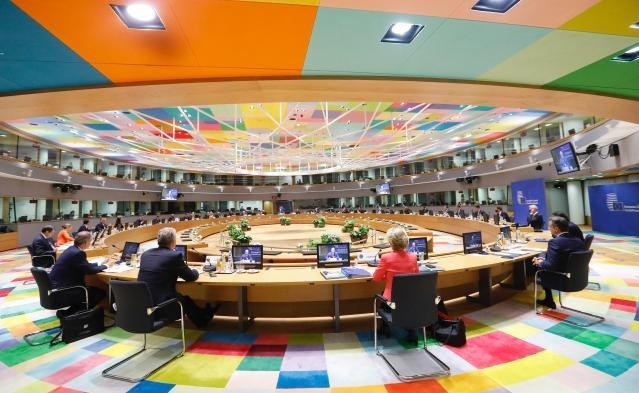After marathon negotiations, the European Council adopted on Tuesday morning conclusions on the recovery plan and multiannual financial framework for 2021-2027.
A triumphant European Council president Charles Michel tweeted, “We did it! We have reached a deal on the recovery package and the European budget for 2021-2027. This is a strong deal. And most importantly, the right deal for Europe right now.” French president Emmanuel Macron tweeted that it was” a historical day for Europe”.
We did it! We have reached a deal on the recovery package and the European budget for 2021-2027.
This is a strong deal. And most importantly, the right deal for Europe right now. #EUCO pic.twitter.com/c6fQ5ppwpf — Charles Michel (@eucopresident) July 21, 2020
At a press conference around 6:00 AM on 21 July, Michel described the negotiations as a marathon which ended in success for all 27 member states.
Related News
- European Central Bank President welcomes the agreement reached in Brussels
- European Summit: Belgium welcomes agreement 'in line with EU challenges'
- Frugal Five delay agreement on EU recovery plan
“This deal will be seen as a pivotal moment in Europe’s journey and will launch us into the future. It sends a strong signal that Europe is a force for action. For the first time EU’s budget will be linked to its climate objectives and the budget spending to the respect of the rule of law,“ he declared. “The magic of the European project works.”
European Commission president Ursula von der Leyen said that the new budget instrument, Next Generation EU for the recovery of the member states, had been adopted in record time and assured that the total budget, €1,800 billion, was neither too little nor too late. “The member states trusted the Commission. The recovery will be green and contribute to the modernisation of EU.”
But she also regretted that “far reaching adjustments” had been made in EU’s multiannual financial framework (MFF), without specifying which.
To get the deal through, the council had to increase the “rebates” or lump-sum corrections for Denmark, Germany, the Netherlands, Austria and Sweden to compensate them for higher contributions to the EU budget after Brexit.
For Michel, this did not come as surprise and was seen as building blocks in the process of reaching a unanimous decision acceptable to all member states. At the end the Frugal Five - Denmark, The Netherlands, Austria, Sweden and Finland – gave up their opposition against the composition of the recovery fund and accepted that a large part of it would be in form of grants as in the original proposal.
The first part of the council conclusions deals with the recovery effort, which is “significant, focused and limited in time”. The second part deals with the MFF and reflects discussions held over many months. The overall amount in the MFF is €1,074 billion, which is somewhat lower than in earlier draft budget from February.
The additional funds generated by the EU's borrowing will be disbursed as grants and loans via the instruments and programmes of the MFF.
For Next Generation EU the Commission shall be empowered to borrow funds on the capital markets on behalf of the Union up to the amount of EUR 750 billion in 2018 prices; new net borrowing activity will stop at the latest at the end of 2026.
The Union shall use the funds for the sole purpose of addressing the consequences of the COVID-19 crisis. The funds borrowed may be used for loans up to an amount of €360 billion in 2018 prices and for expenditure (grants) up to an amount of €390 billion in 2018 prices.
The main parts of the fund will be committed for the years 2021 and 2022. As a rule, the maximum volume of the loans for each member state will not exceed 6.8% of its GNI. The repayment shall be scheduled, in accordance with the principle of sound financial management, so as to ensure the steady and predictable reduction in liabilities until 31 December 2058.
On the issue of allocation, the decision follows the Commission proposal and is based on the 2015-2019 unemployment rates. For the year 2023, the “unemployment criterion is replaced, in equal proportion, by the loss in real GDP observed over 2020 and by the cumulative loss in real GDP observed over the period 2020-2021 and will be calculated by 30 June 2022”.
An important element in Council decision is that member states shall prepare national recovery and resilience plans setting out the reform and investment agenda for the years 2021-23. These plans shall be assessed by the Commission and approved by the Council, by qualified majority on a Commission proposal. Payment requests will be subject to the satisfactory fulfilment of the relevant milestones and targets.
In a concession to the Frugal Five, the decision states that, “if, exceptionally, one or more member states consider that there are serious deviations from the satisfactory fulfilment of the relevant milestones and targets, they may request the President of the European Council to refer the matter to the next European Council.
The Council underlined the importance of both protecting EU’s financial interests and respecting the rule of law in the member states. The second issue is contentious, especially for Hungary and Poland, that are accused of undermining the independence of their judiciaries.
According to the decision, a “regime of conditionality to protect the budget and Next Generation EU will be introduced” and the Council “will revert rapidly to the matter”.
M. Apelblat
The Brussels Times

